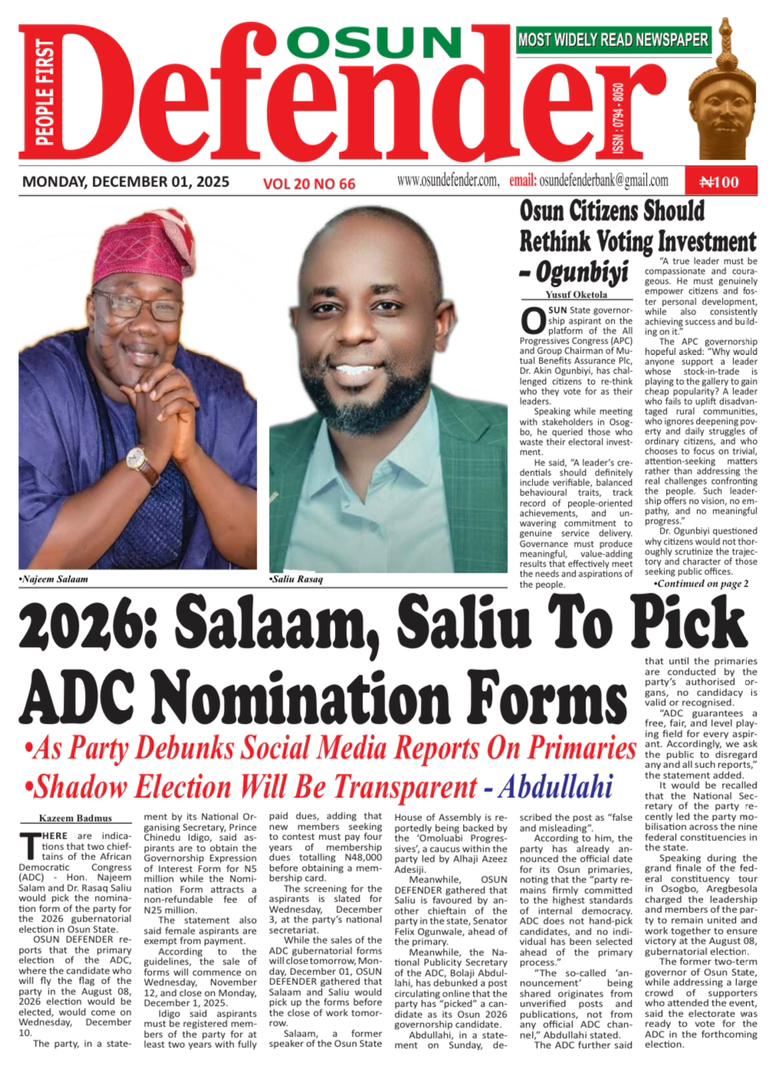BY ADEMOLA YAYA
THE much talked about 2023 General elections – the Presidential and National Assembly – first batch – is done with, remaining governorship and State Assembly elections on March 11. Although Asiwaju Bola Ahmed Tinubu of All Progressive Congress (APC) was declared winner and President-elect by the Independent National Electoral Commission (INEC) on Wednesday, March 01, 2023 having polled 8,794,726 (eight million, seven hundred and ninety-four thousand, seven hundred and twenty-six) votes in 12 states. He lost in his adopted and ancestral states – Lagos and Osun – to Labour Party (LP) and Peoples Democratic Party (PDP) respectively. It is a remarkable note as per his “traditional base” as votes from the northern states largely contributed to his victory notwithstanding the fact that Governor Abduallahi Ganduje could not victoriously deliver Kano, Governor Nasir El-Rufai could not deliver Kaduna, President Muhammadu Buhari could not deliver Katsina, Governor Simon Lalong could not deliver Plateau and Aduda could not deliver Abuja for him.
As a matter of fact, if the PDP aspirants had stepped down for a singular candidate during their primary, the victory would have been the other way round. For instance, the insistence of Alhaji Atiku Abubakar to become PDP flagbearer at all cost made Peter Obi and Rabiu Kwakwanso, who were all traditional PDP, defected to other platforms – LP and New Nigeria Peoples Party (NNPP) to contest. Again, five PDP Governors also known as G-5 Governors did not take it easy with the PDP leadership as Atiku could not be a presidential candidate while Iyiocha Ayu remains the National Chairman from same northern region. They threatened to work against Atiku unless PDP addressed their grievances and eventually carried out the threat, which also contributed to PDP defeat. If PDP had had a consensus, which may not necessarily be Atiku, 6,984,520, 6,101,533 and 1,496,687 of PDP, LP and NNPP votes totalling 14,582,740 in 24 states would have devoured APC 8,794,726 votes in 12 states. However, it was not to be.
In another perspective, LP victory in APC traditional base, especially Lagos should not be given ethnic colouration. Yes, Igbos have substantial population in Lagos and voted for their own but what is their percentage? Do they outnumber Yorubas and other ethnic nationalities in Lagos? The answer is simply no! The defeat of APC and PDP by LP has to do with residual of #EndSARS protest combined with illusion in LP seen as a “Third Force” by everyone dissatisfied with the heritage of PDP and APC. Hence, the defeat of APC in its strongholds and poor performance of PDP in its traditional domain would have given LP victory but for massive votes for APC from the Northern Nigeria.
In Osun, the last Saturday election result was a disaster and fatal blow for APC as the PDP won the presidency, all the three senatorial seats and nine House of Representatives. Osun APC defeat gradually began when Governor Mai Mala Buni led APC Caretaker Extraordinary Convention Planning Committee (CECPC) threw open the party membership and allowed those who had nothing in common with progressives to join the party. It hastened its defeat when it started alienating and attacking the real progressives in the party. The final straw on the camel back was on July 31, 2021 when it held a shambolic Ward Congress with no proper accreditation and result sheets throughout the 332 wards with pictures of the other two candidates (behind which their supporters ought to queue) largely absent. This crisis was unresolved and snowballed to 19th February, 2022 parallel congress to elect governorship candidate while charade called primaries were held to choose candidates for Senatorial, House of Representative and State Assembly positions. They were all handpicked by the Governor and the party leadership. Meanwhile, those who bought forms and had prepared for primaries but were sidetracked were not refunded their money nor pacified for injustice meted to them. The rest is history but the defeat of APC is self inflicted.
I congratulate Asiwaju on his victory but there will not be any honeymoon. He must hit the ground running as clouds and storms of hunger, anger and frustrations have gathered and still gathering momentum all around Nigeria. What can clear the air is if his government addresses these problems on time. He must address high cost of living, unemployment, affordable but qualitative education and healthcare, scarcity and high cost of petrol, kidnapping, terrorism and insecurity generally, reduction of poverty index that has increased by 50% under his party watch amongst others.
The mileage covered by Peter Obi’s LP especially in cosmopolitan states like Lagos where consciousness is higher than countryside explains the yearning of the poor people, especially the young, for an alternative political platform that can represent their interest.
The import of this is that a new party or a small party with credible leadership and candidates with pro-poor people programmes and policies could turn the table around to defeat the so-called big ruling and main opposition parties. It may not have the capacity at the national level immediately but it could spring surprises at local, states, and regional levels. While daily struggle for better life continues, it is time to rebirth and nurture such a party that will be for the majority poor with credible leadership as the existing ruling parties – APC and PDP – apparently do not have what it takes for transparent internal democracy, idea-driven politics and governance, and radical social transformation for prosperity for the majority, which are what we require as a people at this particular period.










